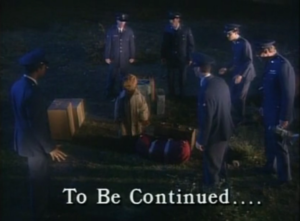The Oscars are almost upon us. Once again, my friend Daisy and I have striven to watch all of the best picture nominees so that you don’t have to. And once again, it’s taken way longer than we’d like to manage it. So without further ado, let’s rank some nominees. And say whether I’d have bothered watching them without a nomination. Or if it even would have been made if it weren’t fishing for awards (by way of a for instance, The King’s Speech, Theory of Everything, and Imitation Game seem to have no purpose outside of Oscar season). And what actors from superhero or equivalent projects are in them.
I guess there was a little ado left after all.
9. Denzel Washington Won’t Shut Up
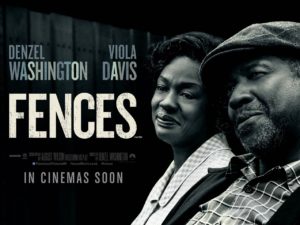
I’m-a spoil this movie because it’s bad and you shouldn’t watch it.
You don’t need to be told that this movie is based on a play. Denzel Washington’s direction is only a step or two removed from just filming a stage performance. Anyway, apparently Denzel enjoyed doing this play on Broadway so much that he got all the cast back together and made it a movie.
Which baffles me. Because this movie is bad. And I assume the play was bad as well.
Denzel Washington plays Troy Maxson, a sanitation worker in the 1950s, who is consumed with bitterness over the fact that his professional baseball career came and went before the league was desegregated. As a result, he’s shitty to everyone in his orbit. He’s a bad husband, to the point where he fathers a child with another woman and doesn’t even bother to apologize for it when he comes clean. He’s an awful, awful father, with one son who grew up while Troy wasin prison, and a second he actually raised, but since that second son lived in a house (paid for with the money Troy’s brother got for being brain-damaged by the war) and didn’t starve to death, Troy keeps waiting for his Father-of-the-Year trophy. Putting aside refusing to show even the slightest affection for his own child, he acts like a job in a grocery store is the best his son could ask for, blocks a college recruiter from signing him because sports are involved (after all, why would he want to play football and get a full college scholarship when he has already has a menial job that can sustain a minimal quality of life?), nearly chokes his son to death with a baseball bat for standing up to him, then kicks him out of the house. And you know what, let’s not put “refusing to show even the slightest affection” aside, let’s bring that right back, because that pushes the equation from “disillusioned by life thanks to racist America” and fully into “is just a complete asshole” territory. Whites-only water fountains did not force him to hate his own child. And yet any time he’s confronted over this, he pulls out the fact that he’s provided food and shelter, you know, the absolute minimum amount of parenting you can do and not end up in court, like that’s some huge unimpeachable favour. As Chris Rock put it… You’re supposed to do that! What do you want, a cookie?
He’s awful. He’s painful to watch, and not in a good, cathartic way, just in the “why are you letting this man have two hours of my life” way. And 90% of the movie is him delivering long-winded monologues that take a lot of words to say practically nothing. Seriously, Troy Maxson has more dialogue than the protagonists of three other best-picture nominees combined*, and yet not one word of it is relatable, interesting, or able to generate sympathy, or indeed anything but contempt, for this utter waste of a person.
And if that weren’t bad enough, when he finally manages to die, there is an epilogue that feels about 45 minutes long (probably closer to 10, but feels longer) in which everyone stands around pretending that Troy wasn’t as demonstrably, irredeemably terrible as we just saw him being. His widow claims Troy somehow did a good job raising his son, as though his son’s every accomplishment were because of Troy rather than in spite of him, and says she’s going to raise Troy’s illegitimate daughter the same way. And if that isn’t all Child Protective Services needs to hear to step in, what could be?
Viola Davis does her best, but Troy is so remorselessly long-winded that Denzel Washington sucks the air out of every scene not focused on his brain-injured brother. If you want to see Viola Davis in something, you’d be better off watching Suicide Squad yes I said it Suicide Squad is better than Fences COME AT ME.
It’s bad. It’s just bad. It is very nearly Tree of Life bad and I hate that it exists.
*Lion, Manchester by the Sea, and Moonlight, for those keeping score.
Would you have watched it without Oscar nominations? Good lord no. The trailer was terrible and the movie is worse.
Glad you did? No, no, a thousand times no.
Would it exist without Oscar Season? Probably. I mean, it looks like an “actor showcase,” a movie designed to get actors awards, but it was a passion project for Denzel and that’s all it took.
Featuring: Amanda Waller.
8. Turns Out Death is Sad, Who Knew
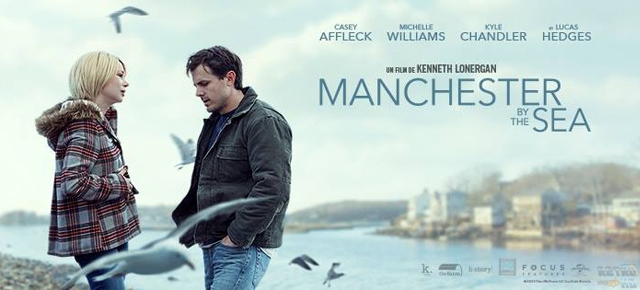
Years ago, Lee Chandler suffered a horrific, unspeakable tragedy that has come to define his entire life. He’s a hollowed out shell who’d rather pick a drunken fight with a stranger than get picked up by a pretty woman. But when his chronically ill brother passes away, he has to return to his hometown of Manchester by the Sea (where he’s become a person of infamy) to take care of his teenaged nephew.
The point, the central thesis of this movie, is that no matter the tragedy, no matter your pain, it cannot stop life’s inconveniences. This is encapsulated in a moment where a woman, on the worst day of her life, is being loaded into an ambulance… but the gurney won’t fold up, and the paramedics spend long enough futzing with it it becomes a moment of comedy… which is surrounded by unspeakable tragedy.
That’s not the worst central theme. And there are certainly some very strong performances* in it. But… now that you’ve got all of that, I don’t know, maybe tell a story. There is very little narrative, just a lot of shots of Casey Affleck looking sad or emotionally blank, and then eventually it just trails off and rolls credits.
Critics seem to adore it. Great reviews everywhere. I just… I don’t get it. I was just kinda bored.
*Casey Affleck’s performance is somewhat overshadowed by revelations that he is allegedly pretty shitty to women. If that costs him the Oscar, well, maybe don’t be shitty to women, Hollywood stars. I just wish that didn’t mean it would go to Denzel Washington, because Fences doesn’t deserve awards, it deserves to be spat on.
Would you have watched it without Oscar nominations? No. No human being could hear the description and think “That sounds like a fun night out.”
Glad you did? Meh.
Would it exist without Oscar Season? Kind of unlikely but I can’t rule it out.
Featuring: Green Lantern’s dad.
7. Jesus and Explosions
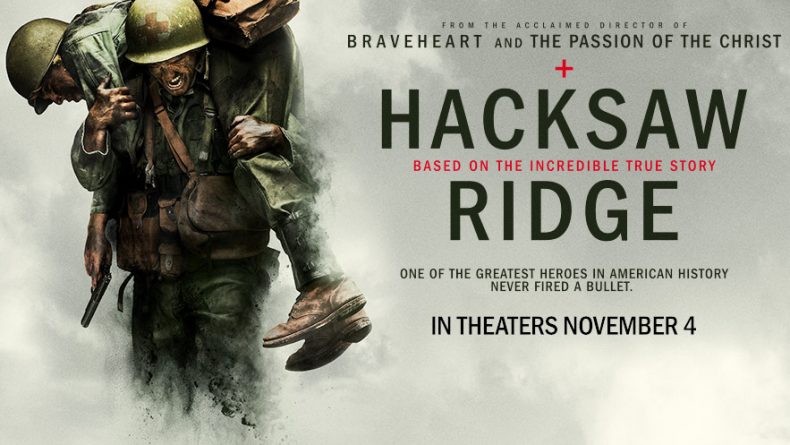
In our first (of four) “based on a true story” movies, Desmond Doss wants to go to war to serve his country, but his Christianity and deep personal convictions against violence forbid him from even holding a gun. Naturally, the army doesn’t care for this, and makes boot camp as unpleasant as they can to drive him out. But when he is ultimately allowed to serve as an unarmed combat medic, he ends up at the battle of Hacksaw Ridge in the South Pacific, where he stays behind after a US retreat, spending days getting wounded soldiers off the ridge to safety in an improvised harness. Which, as far as the movie is concerned, inspires the US troops into a more successful attack. Finding out that the Japanese troops had tunnels didn’t hurt either.
This one was better than I expected based on the trailer, which kind of sums up the whole story. The second act, where the army hates Desmond’s commitment to pacifism, dragged exactly as much as I thought it would. It is the primary weakness of the movie. But the first act, where we get to know Desmond, is far more charming than I expected, and the third act is pretty spectacular. Braveheart with explosions and flamethrowers.
Which brings me to the other flaw*. Through Desmond, the movie tries to portray the nobility of pacifism, how it’s possible to serve without violence, celebrating his refusal to throw a punch or take a life. But through every other US soldier, wow but the movie is celebrating violence. You’re not going to find a movie this in love with gore outside of, or frankly even including, the Saw franchise. So it’s kind of a mixed message. Is Desmond noble because of his pacifism, or is he noble because his pacifism inspires the other soldiers to be better at war-murder? Pick a lane, Hacksaw Ridge.
*Yes, Mel Gibson said terrible things about Jewish people that time, and no, I don’t have any concrete reason to think he’s stopped thinking them, but he keeps it out of the movie, at least. Well, if you’re Japanese, you might not have the best time, but it’s about US troops in the Pacific theatre, there’s not a great way to depict the Nazi-allied Japanese troops favourably.
Would you have watched it without Oscar nominations? Probably not. That second act looked excruciatingly tiresome.
Glad you did? A little. Slightly indifferent.
Would it exist without Oscar Season? Probably. Hollywood loves them some World War II movies.
Featuring: Spider-man, Elrond, the Avatar guy… VInce Vaughn has zero comic book movies? Or Star Warses? Bonds? Just a lesser Jurassic Park movie? Huh. Weird.
6. Google Earth To The Rescue
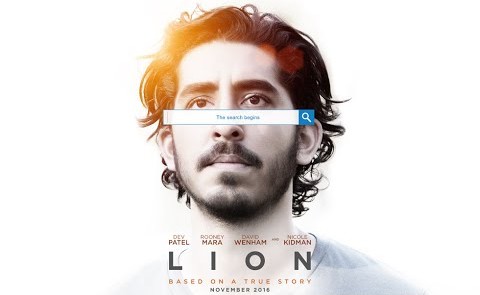
“Based on a true story” number two, and also the second the show the real people involved under the credits (Hacksaw did it too). As a small child, Saroo… okay, let’s just get this out of the way, he only thinks his name is Saroo because that’s how young he was, his properly pronounced name means “Lion,” that’s why it’s called that. As I was saying. Young Saroo idolizes his older brother Guddu so much that he insists on following him to his night job lifting bales, despite being a) too small to be doing heavy lifting, and b) too young to be up that late. Predictably, this goes very, very wrong, and he wakes up alone on a moving train, and ends up stranded in Calcutta, on the far side of India from home.
(I don’t mind spoiling the general plot here, because it is all very, very obvious. There are not two ways this movie can go.)
Unable to even correctly name his village, he ends up (after some ordeals) in a Calcutta orphanage, where he is adopted by an Australian couple in Tasmania. Years later, having grown into Dev Patel, an encounter with an Indian dessert he’d coveted as a child reminds him of his life pre-Calcutta, and of the brother and mother he left behind. A classmate suggests that this new program called “Google Earth” might help him take his decades-old memories and reverse engineer the location of his village. Haunted by the thought of Guddu and his mother desperately searching for him (he also had a sister, but doesn’t seem to care much), he becomes consumed with trying to find home.
That’s the premise. And like I said, there aren’t a lot of ways it can go. If Saroo just went a little crazy and then eventually saw a therapist and moved on, there’s no movie. So here’s the first issue… every stage of the story lasts just a little too long. When you know exactly where the story is going, the movie needs to work extra hard to keep you from getting impatient for the next beat. Allied managed this quite well, considering there’s an hour of movie before the part that’s in all the trailers. Lion occasionally struggles. Second, while the director is mostly effective at evoking emotional response, it can be a little nakedly emotionally manipulative. People want to emotionally respond to a movie, and the director is supposed to make you do that, but nobody likes to see the strings.
Would you have watched it without Oscar nominations? There’s every chance. I do like Dev Patel.
Glad you did? I think so. It’s kind of touching.
Would it exist without Oscar Season? There is every chance. It’s not too showy about being uplifting, doesn’t scream “actor showcase.”
Featuring: Aquaman’s Mom, Faramir, The Girl With The Dragon Tattoo, the manager of The Best Exotic Marigold Hotel (not a blockbuster but check it out, it’s so charming)
5. It’s Hard to be Gay in the Ghetto
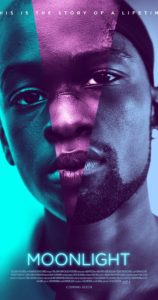
The story of Chiron, a young gay child in a terrible neighbourhood, being raised by a drug addict single mother. That his life is not easy goes without saying.
We see three stages of Chiron’s life: as a young child, who ends up under the wing of a caring drug dealer and his girlfriend; as a bullied teen, whose drug dealer surrogate father is apparently dead, I think they mentioned that and I just missed it; and as an adult, after being poor, black, and ostracized have left him with precious few options in life, reuniting with the only man he’s ever loved.
(This is based on a play that was based on the life of the playwright, so he gets better, not that you’d know from this movie.)
At first I had trouble with this movie, as I can have difficulty connecting to protagonists who are largely defined by silence, as young Chiron is. But after the non-stop blather coming out of Fences’ Troy Maxson I have a new appreciation for it.
It’s very well done, with some very strong supporting performances from Mahershala Ali and Naomie Harris. It does, however, have even less of an ending than Manchester by the Sea. It just kind of… stops. I mean, some stories don’t really have a nice “tie it with a ribbon” ending but seriously, this practically goes to credits mid-scene.
Would you have watched it without Oscar nominations? It got enough buzz that I might have had to check it out.
Glad you did? Pretty much.
Would it exist without Oscar Season? Maybe yes, maybe no, but it should. A far more valuable story to tell than “Stephen Hawking loved a Christian.”
Featuring: Cottonmouth, Moneypenny
4. Love in the Time of Space Squids

Louise Banks is a mother whose child succumbs to a rare form of cancer. She is also a genius linguist who gets tapped by the US military when 12 alien spaceships arrive on Earth and we need to figure out how to talk to them. Louise and physicist Ian Donnelly lead the US attempt to talk to our new visitors, while the Chinese get ornery and society straight-up panics.
But why are the aliens here? What do they want? What’s the thing I’m not telling you? Well, I’m not telling.
It’s quite well done. The music, which resembles the odd horn-like speech of the space squid aliens, is highly effective. The visuals work. I would watch Amy Adams and Jeremy Renner in anything short of a Joseph and the Amazing Technicolor Dreamcoat movie (fun fact, I hate that show more than almost anything). The actual science behind “How do we communicate with a race whose mere manner of speech and writing is absolutely alien to us” is pretty fascinating. And they pull off a twist I didn’t see coming, and that ain’t easy, because like most modern audiences I’ve seen enough twists that I can sense them coming from the narrative hints. But they pulled this one off.
Would you have watched it without Oscar nominations? Lord knows I meant to.
Glad you did? Yep yep.
Would it exist without Oscar Season? Given that sci-fi movies and the Oscars go together like Mel Gibson and a “friends of Israel” dinner, I’d have to say yes.
Featuring: Lois Lane, Hawkeye, Saw Gerrera
3. In Which Banks Suck Worse Than Bank Robbers
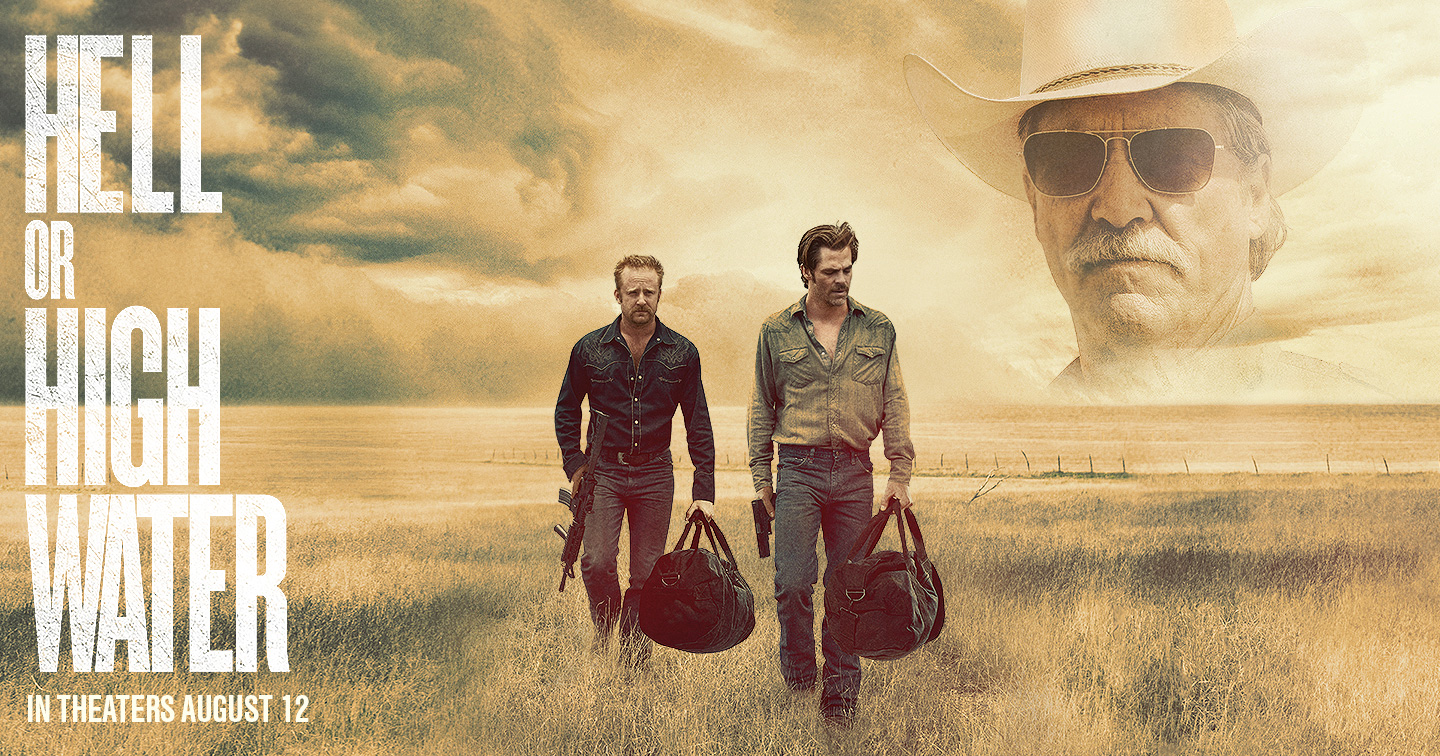
And sometimes the Oscars choose to nominate a really well done crime movie.
Toby Howard (Chris Pine) and his ex-con brother Tanner (Ben Cross) hatch a plan to save their family ranch, swimming in debt after their late mother’s long illness. They begin robbing branches of the bank that holds their mortgage, laundering the money at an out-of-state Indian casino so they can pay off the mortgage with it. Paying off the bank with its own stolen money.
Meanwhile, Jeff Bridges is a Texas Ranger on the verge of retirement who catches the case, and tries to stop the robberies before they get bloody.
I can’t promise they don’t get bloody. Tanner is not overburdened with self-control.
This one is just good. Really good. The cast is excellent, the direction is solid, there’s suspense and humour… and a subtle view into the economic blight that has hit rural America as globalization and mechanization reduce the need for a blue-collar workforce*. It’s just really quite good.
*The movie does not spend time pontificating as to why times are tough in rural America, that was me, it just casually points out that this is so. After all, if it weren’t for for-profit health care and predatory lending, maybe nobody needed to rob any banks**.
**The movie doesn’t spell that out either but it’s not exactly a tough conclusion to reach if you’re paying attention.
Would you have watched it without Oscar nominations? I’m surprised it took me this long, I heard nothing but good things back in the fall.
Glad you did? Hoo-rah.
Would it exist without Oscar Season? Damn skippy.
Featuring: Captain Kirk, Angel from the worst X-Men movie, Obidiah Stane
2. Obligatory “Ain’t Hollywood Great” Movie
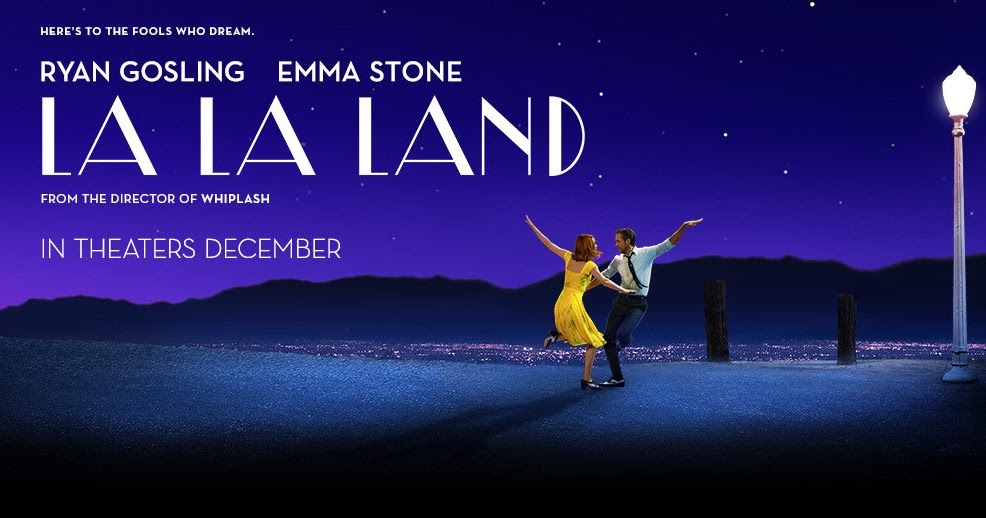
If there is one thing the Academy of Motion Picture Arts and Sciences loves, it’s movies about World War II. If there are two, it’s movies about how great the movies are.
(Actually for the full list of things the Academy loves, watch The King’s Speech)
La La Land was greeted with wave after wave of accolades when it was released. And for good reason. It’s fun, moving in places, the songs are fun, and I really enjoyed what they did with colour schemes. Seriously, for something defined by music, it’s hella impressive visually. The leads might not be musical prodigies but they’re plenty charming.
Post-accolades, there was wave after wave of backlash, mostly having to do with how white the characters are. And you know what, I’m leaving that topic alone. It just gets me in trouble. I mean, I could say “The black character isn’t trying to sell out jazz, he is arguing against being a strict traditionalist in a musical style that is, by its very nature, experimental.” I could say “Sebatstian is not ‘mansplaining’ jazz to Mia because she doesn’t know anything about jazz and you can’t just throw the word ‘mansplaining’ around willy-nilly and not have it lose meaning and power.”
But we’ll move past that. This is my personal ranking list, so I’m-a just say it’s fun, charming, sweetly melancholy, and I enjoyed it a lot. So it stays at number two, and everyone shouting that it winning Best Picture is some sort of Hollywood apocalypse can consider chilling out.
Gladiator won Best Picture and the world didn’t end. Relax.
Would you have watched it without Oscar nominations? Most definitely.
Glad you did? Yeppers.
Would it exist without Oscar Season? I don’t know, would the film industry need to jack itself off without getting trophies for it?
Featuring: Gwen Stacy, J. Jonah Jameson
1. Black Women Do Math and Be Awesome
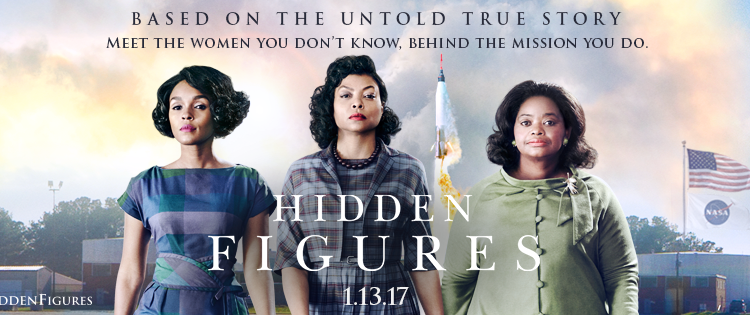
Now Hidden Figures is the whole package.
Set in a time when “Computer” meant a person who does a shit-ton of calculations by hand, Hidden Figures is based on the little-known true story of the black women who proved instrumental in getting America into space. Hidden Figures centres on three women: mathematical genius Katherine Johnson, who goes from checking white men’s numbers (right before it becomes obsolete) to inventing the math needed to get John Glenn back from orbit; Mary Jackson, who fights to become a full NASA engineer, despite needing to go to court to win the right to attend night school in segregation-era Virginia; and Dorothy Vaughan, who sees that all the women she supervises (in all but title and pay scale) will soon be put out of work by the new IBM machine, so teaches herself how to work it better than anyone else, then passes it on to her staff. These three women each play a key role in NASA’s mission, while struggling against the realities of life in racist Virginia.
This is an important story about a part of history that’s been largely ignored: the vital contribution of women of colour, marginalised then, marginalised now. And if that weren’t enough, it’s also got an amazing cast and is legitimately fun to watch. Sure, there are a couple of white saviour characters, the most notable being the saint-like John Glenn, who as far as these things go ranks just below Brad Pitt’s Canadian Abolitionist Jesus from 12 Years a Slave, but, well… desegregating NASA needed someone at the top to be on board. And if that means seeing Kevin Coster take a crowbar to the “coloured bathroom” sign, I’m down with that.
And just in case anyone wanted to breathe a sigh of “Things are better now,” the movie opens with the women afraid for their lives after being approached by a white police officer (and how’s that going, America?) and has the best piece of shade thrown at the “I’m not racist, but…” crowd. When a white superior tries to make nice with Dorothy by saying “I actually don’t have anything against y’all,” Dorothy sighs, and replies “I know. I know you probably believe that.” Perfect.
Would you have watched it without Oscar nominations? I think so. The buzz was so strong I was considering it before the nominations were announced.
Glad you did? Sure am.
Would it exist without Oscar Season? I’d really like to think so. I don’t, but I’d like to.
Featuring: Pa Kent, Mary Jane, Cottonmouth again
So that’s the lot. Sure there’s more to say, from “What the hell accent does Andrew Garfield think he’s doing in Hacksaw Ridge, it is just aggressive” to “Where is Amy Adams’ Oscar already” to “Seriously, what is it about Fences anyone liked,” but this is all we have time for.
See y’all at the show. And next time.

